虚拟语气-讲解版
虚拟语气讲解和练习(附答案)
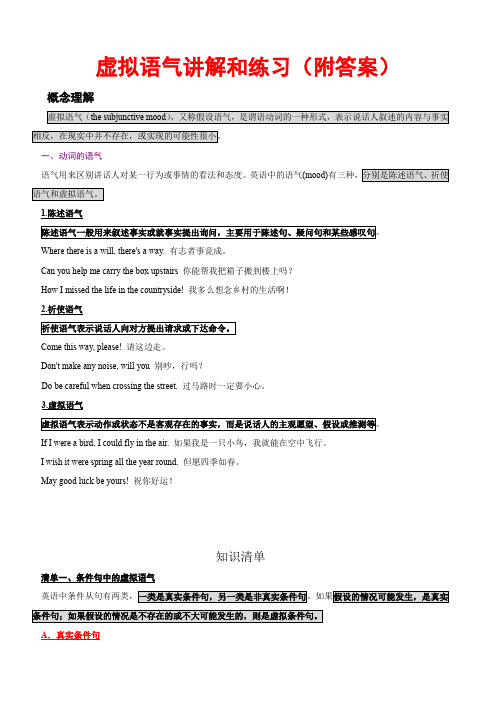
虚拟语气讲解和练习(附答案)概念理解一、动词的语气语气用来区别讲话人对某一行为或事情的看法和态度。
英语中的语气(mood)1.陈述语气Where there is a will, there's a way. 有志者事竟成。
Can you help me carry the box upstairs 你能帮我把箱子搬到楼上吗?How I missed the life in the countryside! 我多么想念乡村的生活啊!2.祈使语气Come this way, please! 请这边走。
Don't make any noise, will you 别吵,行吗?Do be careful when crossing the street. 过马路时一定要小心。
3.虚拟语气If I were a bird, I could fly in the air. 如果我是一只小鸟,我就能在空中飞行。
I wish it were spring all the year round. 但愿四季如春。
May good luck be yours! 祝你好运!知识清单清单一、条件句中的虚拟语气A.真实条件句If he doesn't come at 8, we won't wait for him. 如果他八点不来,我们就不等他了。
If a flood happened in the past, there was usually a great loss of life and property. 过去发生洪水的话,常有很大的生命和财产损失。
We shall go there unless it rains tomorrow. 如果明天不下雨,我们将去那里。
I'll let you use my bike on condition that you keep it clean. 如果你能保持车子干净,我就让你用我的自行车。
高考英语复习语法知识专题讲解10---虚拟语气(解析版)

引导的让步和方式状语从 as if/though
He looks as if he were an artist.
句
He talked about the accident as if he had seen it.
in order that, so that, in case, for fear that
提前,即 故填 were/should/had
Were/Should/Had I..., Were
4. have fallen 解析:句意:要是没有政府和科学家的合作,与艾滋病相关的死亡人数就不会从 2005 年的 最高值降下来。从句“Had...not worked together”是对过去情况的假设,所以主句谓语要用 wouldn't have done.
necessary, natural, strange, important,
等 用 于 句 型 surprising, vital
“It
中, 引导的主语从 is+adj.+that...” that
句中谓语动词常用“(should)do”形式
It is necessary that he(should)sort out the information for my reference.
高考英语复习语法知识专题讲解 专题十 虚拟语气
一.虚拟语气在 if 非真实条件句中的应用
虚拟条件从句(if)
主句
与现在事实相反的 主语+did/were
假设
与过去事实相反的 主语+had done
假设
与将来事实相反的 主语+ 1.did/were
假设
2.should do
虚拟语气讲解

虚拟语气讲解虚拟语气语气和时态、语态一样,是动词的一种形式,表明说话的目的和意图。
英语中有四种语气:陈述语气、疑问语气、祈使语气和虚拟语气。
陈述语气:表示谓语动词所表达的动作或状态是符合客观事实的,也就是把动作或者状态当做事实表达出来或者提出一种看法。
疑问语气:用来提出问题或询问情况的语气。
祈使语气:用来向对方提出请求、邀请,给予忠告、指示、警告、命令等的语气。
祈使句中的主语You一般省略,动词也用原型表示。
虚拟语气:把动作当做一种只存在于讲话人想象中的“假设”或“推测”,而不是当作客观事实中的真实事件。
它表达的通常是怀疑、忧虑、推测、想象或祝愿。
这里主要讲解虚拟语气的一般语法特征和难点。
一、虚拟语气在条件句中的用法条件句分为两种:一种是可能实现的,一种是无法实现的,可能实现的条件句叫真实条件句,不能实践的就是虚拟条件句。
1. 真实条件句:这种条件句实现的可能性非常大。
这类条件句常用if, unless, once, as long as等引导。
Eg. If you have any doubts about our plan, I’ll stop it. 如果你对我们的计划有怀疑,我会立刻终止它。
The secretary will get a pay raise as long as she does her job well. 这个秘书会得到加薪,只要她好好工作。
2. 虚拟条件句:往往指不能实现的或者纯假设的情况,可以对过去、现在或者将来的情况进行假象。
在这三种情况中,主句和从句中的动词也有不同的形式。
A. 与现在情况相反:表示对当前不可能实现的情况的假想,此时从句用一般过去式(did sth./ were...),主句用过去将来式(would/ shoud/ could/ might do sth.):Eg. If I were you, I would choose to work in a small town. 如果我是你,我会选择在小镇工作。
高中英语之虚拟语气详细讲解
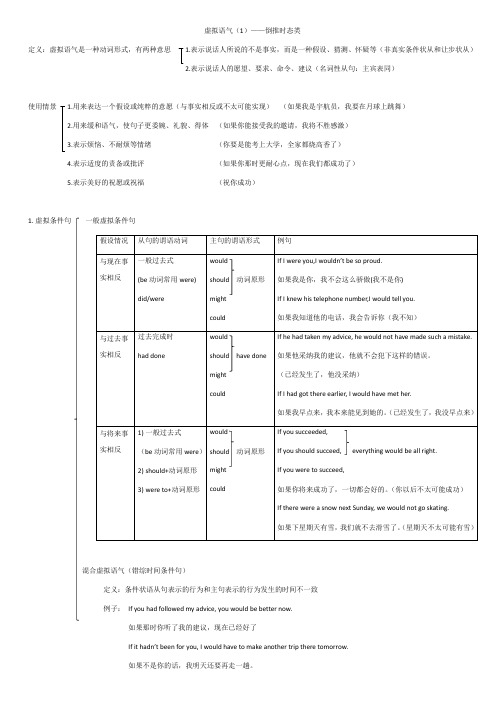
虚拟语气(1)——倒推时态类定义:虚拟语气是一种动词形式,有两种意思 1.表示说话人所说的不是事实,而是一种假设、猜测、怀疑等(非真实条件状从和让步状从)2.表示说话人的愿望、要求、命令、建议(名词性从句:主宾表同)使用情景 1.用来表达一个假设或纯粹的意愿(与事实相反或不太可能实现)(如果我是宇航员,我要在月球上跳舞)2.用来缓和语气,使句子更委婉、礼貌、得体(如果你能接受我的邀请,我将不胜感激)3.表示烦恼、不耐烦等情绪(你要是能考上大学,全家都烧高香了)4.表示适度的责备或批评(如果你那时更耐心点,现在我们都成功了)5.表示美好的祝愿或祝福(祝你成功)1.虚拟条件句一般虚拟条件句混合虚拟语气(错综时间条件句)定义:条件状语从句表示的行为和主句表示的行为发生的时间不一致例子:If you had followed my advice, you would be better now.如果那时你听了我的建议,现在已经好了If it hadn’t been for you, I would have to make another trip there tomorrow.如果不是你的话,我明天还要再走一趟。
If you had studied hard before,you would be a college student now.如果你以前努力学习的话,你现在就是大学生了。
省略+倒装当虚拟条件句的谓语动词中含有were,should,had时,if可以省略,并将were,should,had提前于句首,变为倒装句。
如果虚拟条件句是否定句,not 保留在原处If he should agree to go there, we should send him there.= Should he agree to go there,we should send him there.If she were there,she would agree with us.= Were she were, she would agree with us.If he had learnt about computers,we would have hired him.= Had he learnt about computers,we would have hired him.含蓄虚拟条件句定义:有时为了表达的需要,在虚拟语气中并不总是出现if引导的条件状语从句,而是通过其他手段来代替条件从句分类:1) but for....=(If it+be not for) ;without;Without your help ,we couldn’t have finished the work ahead of time.= But for your help,we couldn’t have finished the work ahead of time.= If it hadn’t been for your help,we couldn’t have finished the work ahead of time.没有你的帮助,我们不可能完成任务。
虚拟语气语法讲解

虚拟语气语法讲解语法讲解--虚拟语气英语中有三种不同的语气:陈述语气,祈使语气和虚拟语气。
虚拟语气表示动作或状态与事实相反,或不可能发生的情况。
一.虚拟语气用于条件状语从句中1. 表示与现在事实相反或不可能发生:条件状语从句:一般过去时(虚拟语气中be→were)主句用:would(should, could, might)+动词原形。
If we had time now, we would read it again.If I were you, I would work hard.2. 表示与过去事实相反或不可能发生:条件状语从句:had+过去分词;主句:would(should, could, might)+have+过去分词。
If he had taken my advice, he would have succeeded in the test.If I had known your telephone number then, I would have called you.3. 表示与将来的事实可能相反或不可能发生:条件状语从句:①一般过去时②should +动词原形③were to+动词原形;主句:would(should, could, might)+动词原形。
If it should rain, the crops would be saved.If it were to snow tomorrow, they would not go out.P.S 虚拟条件句的特殊情况(1). 混合/错综型虚拟语气当条件状语从句表示的行为和主句表示的行为所发生的时间不一致时,称为‘错综条件句’,动词的形式要根据它所表示的时间作出相应的调整。
If you had followed my advice, you would be better now.(从句说的是过去,主句是现在)If I were you, I would have taken his advice.(从句是现在,主句是过去)(2)省略if的虚拟语气如果从句中含有were/ should/ had时,则可以把这三个词置于句首,省略if.采用倒装语序。
最经典最清晰虚拟语气讲解
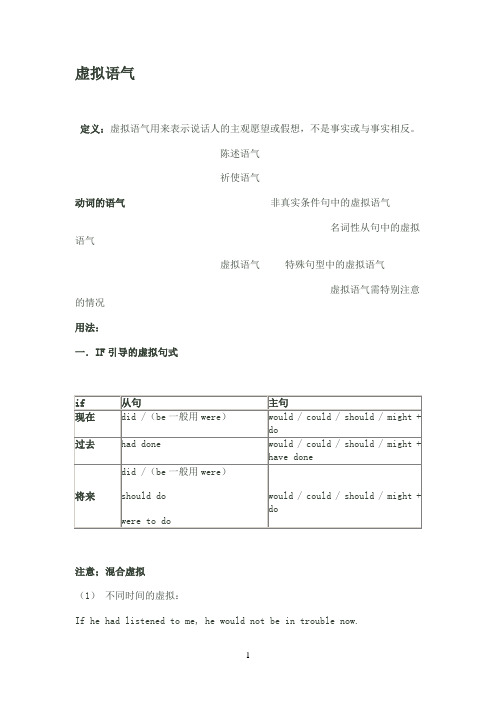
虚拟语气定义:虚拟语气用来表示说话人的主观愿望或假想,不是事实或与事实相反。
陈述语气祈使语气动词的语气非真实条件句中的虚拟语气名词性从句中的虚拟语气虚拟语气特殊句型中的虚拟语气虚拟语气需特别注意的情况用法:一.IF引导的虚拟句式注意;混合虚拟(1)不同时间的虚拟:If he had listened to me, he would not be in trouble now.If he had told me yesterday, I should know what to do now.(2) 虚拟与陈述的混合:He could have passed the exam, but he wasn’t careful enough. You should have come earlier, the bus left a moment ago.二.名词性从句中的虚拟语气:从句谓语动词(should) +do1.主语从句:it is + adj + that结构2.宾语从句:主语+要求接虚拟语气的动词+that一个坚持:insist两个命令:order; command 两个决定:decide; determine三个建议:suggest; advise; propose四个要求:demand; ask; request; require注意:① suggest:暗示;insist:坚持说(不虚拟)② except, believe, think suspect等动词的否定形式或疑问句后面的宾语从句要用虚拟。
I never thought that he should be such a brave young solider③ should竟然I am glad that your novel should have won the first prize.④ wish引导从句的虚拟语气,谓语动词变化和if从句虚拟语气一样。
英语虚拟语气讲解
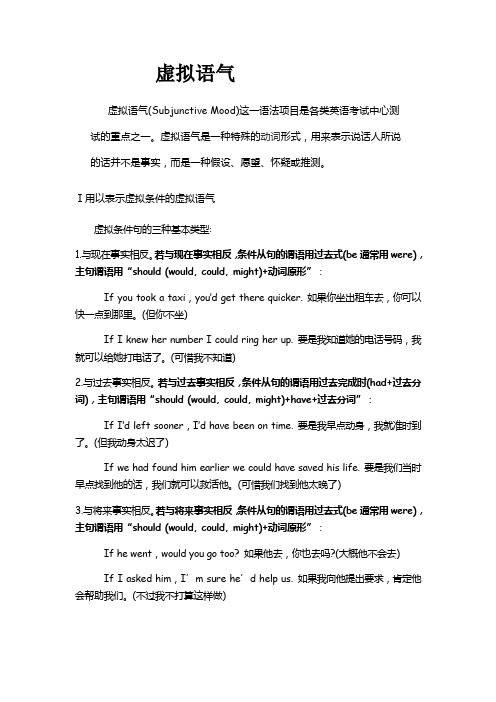
虚拟语气虚拟语气(Subjunctive Mood)这一语法项目是各类英语考试中心测试的重点之一。
虚拟语气是一种特殊的动词形式,用来表示说话人所说的话并不是事实,而是一种假设、愿望、怀疑或推测。
Ⅰ用以表示虚拟条件的虚拟语气虚拟条件句的三种基本类型:1.与现在事实相反。
若与现在事实相反,条件从句的谓语用过去式(be通常用were),主句谓语用“should (would, could, might)+动词原形”:If you took a taxi,you’d get there quicker.如果你坐出租车去,你可以快一点到那里。
(但你不坐)If I knew her number I could ring her up. 要是我知道她的电话号码,我就可以给她打电话了。
(可惜我不知道)2.与过去事实相反。
若与过去事实相反,条件从句的谓语用过去完成时(had+过去分词),主句谓语用“should (would, could, might)+have+过去分词”:If I’d left sooner,I’d have been on time.要是我早点动身,我就准时到了。
(但我动身太迟了)If we had found him earlier we could have saved his life. 要是我们当时早点找到他的话,我们就可以救活他。
(可惜我们找到他太晚了)3.与将来事实相反。
若与将来事实相反,条件从句的谓语用过去式(be通常用were),主句谓语用“should (would, could, might)+动词原形”:If he went,would you go too? 如果他去,你也去吗?(大概他不会去)If I asked him,I’m sure he’d help us. 如果我向他提出要求,肯定他会帮助我们。
(不过我不打算这样做)大多数的虚拟条件句属于上面三种情况的一种,但并不排除存在条件和后果中,一个和现在情况相反,另一个和过去情况相反,例如:If you had followed what the doctor said, you would not have been so painful now.这个句子在高中出现频率颇高。
高中英语语法课件-虚拟语气(全)(共55张PPT)详解
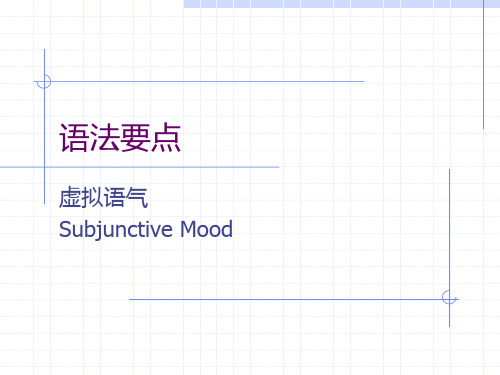
实战练习 5
2001年1月大学英语四级题目: Some women a good salary in a job instead of staying home, but they decided not to work for the sake of the family. A. must make B. should have made C. would make D. could have made
解题思路
这是一道错综时间虚拟条件句。 在本句中,从句是对过去发生的事情进 行假设,主句是对现在情况的假设。 译文:当你掉下来时,如果不是我在梯 子下面把你接住,恐怕你现在就不会笑 了。选A
实战练习 2
If you had taken your medicine yesterday, you ___ well now. A. are B. had been C. would be D. were 正确答案: C
祈使语气主要用于祈使句。 e.g. Get out of here! 虚拟语气
II. 什么是虚拟语气?
虚拟语气是一种特殊的动词形式,表示说话人 所说的话不是事实,而是想象、假设、建议、 打算、意见、愿望、怀疑、推测、喜悦等等。 e.g. If we had met her last night, we would have told her what had happened. 如果我们昨晚见到她,我们就会告诉她发生了 什么事。 (实际上,我们并没有见到她,也没有告诉她 所发生的事。)
注意!!!
如果条件从句是否定式,倒装时只能把 not 放在主语之后,不能用缩写式把not 放在主语之前。 e.g. Had you not told me about the matter, I should never have known the whole thing. (不能说:Hadn’t you told me…)
- 1、下载文档前请自行甄别文档内容的完整性,平台不提供额外的编辑、内容补充、找答案等附加服务。
- 2、"仅部分预览"的文档,不可在线预览部分如存在完整性等问题,可反馈申请退款(可完整预览的文档不适用该条件!)。
- 3、如文档侵犯您的权益,请联系客服反馈,我们会尽快为您处理(人工客服工作时间:9:00-18:30)。
The picture exhibition bored me to death. I wish I ___________to it. A. hadn’t gone C. didn’t go B. haven’t gone D. could not have gone
How I wish I __________that! Everybody present was angry with me. A. didn’t go C. wouldn’t do B. hadn’t done D. wasn’t doing
If only I could see him again next year!
要是我们的父母能和我们住在一起就好了。
If only our parents could live with us!
要是我没错过火车就好了.
If only I hadn’t missed the train!
Exercises:
D. would have been warned; had not taken
I didn’t see your sister at the meeting. If she __________, she would have met my brother.
A. has come B. did come C. came D. had come
“ Have you visited the Science Museum?” “ No, but I really wish I _______.” A. had B. did C. have D. will
I didn’t go to the party, but I do wish I _____there. A. was B. were C. had been D. went I wish I _________ you yesterday. A. see B. did see C. had seen D. were to see
倒装的If虚拟句
条件状语的倒装:
如果条件状语中有were, had, should时, 可以倒 装成:Were / Should / Had +主+其他 If I were you, I would try it again. Were I you, I would try it again. If he had been there yesterday, he would have seen the film. Had he been there yesterday, he would have seen the film. If it should snow tomorrow, we wouldn’t go out. Should it snow tomorrow, we wouldn’t go out.
-----He is a brave man. -----Yes, I wish I _________his courage.
A. Have B. had C. will have D. would have Tom can take his car apart and put it back together again. I certainly wish he _____me how. A. teaches C. has taught B. will teach D. would teach
had done did/were 1.should do 2.were to do 3.did
主句
would/should/could/ might have done would/should/could/ might do even if/ though, wish, if only等从句的虚拟 与它相同。
2.如果我有一百万美元,我会买下这架飞机。
If I had one million dollars, I would buy the plane.
与过去事实相反的虚拟条件句
If +主 +had done sth, 主+would/should/could/might +动词完成式(have done)
虚语语气(the Subjunctive Mood)表示说话人的一种 愿望、建议、命令、要求、有时是一种非真实的假设、 料想,或是不可能实现的与事实相反的愿望。
陈述语气(the Indicative Mood)用来陈述一个事实,或提 出一个想法,有肯定、否定、疑问或感叹等形式。
The fish is not alive without water.
要是明天下雨就好了。(说话人以预料明天不会下雨)
I wish it would rain tomorrow.
5. If only
(1) …要是就好了 = I wish
If only I knew his name now! If only we had followed your advice last time!
If I were you, I would have gone to her birthday party. 如果我是你,我就去参加她的生日晚会了。 (从句说明现在,主句说明过去。)
退一步
海阔天空
名词性从句中要求 用虚拟语气的动词
如果我是你,我就听从他的建议。 If I were you, I would have taken his advice. 从句表示现在,主句表示过去 如果你听我的话,现在就不会这么糟糕了。 If you had listened to me, you might not be in such trouble now. 从句表示过去,主句表示现在 如果这些天一直没下雨,我们现在可以进行 工作了。 If it hadn’t been raining those days, we should be going on with the works. 从句表过去进行,主句表现在进行
_________the exam, he would have attend a college. A. If he passed C. Were he passed B. Had he passed D. If he should pass
_______five minutes earlier, you could have seen them off. A. If you should arrive B. If you arrive C. Had you arrived D. Should you arrive ________it rain tomorrow, we should have to put off the visit to the Science Museum. A. Were B. should C. would D. will
2.如果他明天来的话,我会告诉他.
If he were to come here tomorrow, I would tell him.
If you __________tomorrow, you _________ find the new manager working in the office.
wish引导的虚拟句
wish + that How I wish If only
did/were 现在 had done 过去
would / might /would do 将来
我要是记得地址就好了。(真可惜我忘了)
I wish I remembered the address.
要是他没有离开这里就好了。(他已离开) How I wish he had not left.
与将来事实相反的虚拟条件句(通常有时间状语)
could/might +动词原形
1.如果他明天来的话,我会告诉他这件事.
If + 主 + did(were to /should do), 主+would/should/
If he came here tomorrow, I would tell him about it.
If my lawyer _______here last Sunday, he _______ me from going . A. had been; would have prevented B. had been; would prevent C. were; would prevent D. were; would have prevented
1.如果他努力学的话,他就通过这次考试。
If he had worked hard, he would have passed the examination.
2.要是当时我和她结了婚的话,那我是很不幸的。
If I had married her, I would have been unhappy.
现在: 过去: 将来 : did /were(现在) had done(过去)
would+动词原形(将来)
She loves the baby as if it were her own son.
He speaks as if he had been to the United States.
时间 条件从句 if 过去 现在 将来
A. arrives C. had arrived
B. arrive D. has arrived
If he _________he ___________that food. Luckily he was sent to the hospital immediately. A. was warned; would not have taken B. had been warned; would not have taken C. would be warned; had not taken
